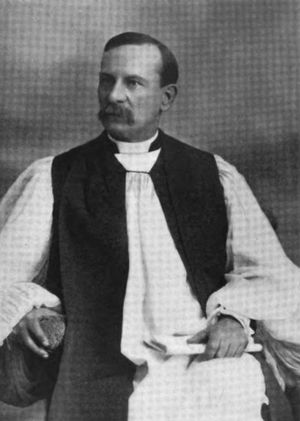George William Peterkin facts for kids
Quick facts for kids The Right Reverend George William Peterkin D.D., LL.D. |
|
|---|---|
| I Bishop of West Virginia | |
 |
|
| Church | Episcopal Church |
| Diocese | West Virginia |
| Elected | March 1, 1878 |
| In Office | 1878-1916 |
| Successor | William Loyall Gravatt |
| Orders | |
| Ordination | June 25, 1869 |
| Consecration | May 30, 1878 by Gregory T. Bedell |
| Personal details | |
| Born | March 21, 1841 Clear Spring, Maryland |
| Died | September 22, 1916 (aged 75) Parkersburg, West Virginia |
| Buried | Hollywood Cemetery |
| Nationality | American |
| Denomination | Anglican |
| Parents | Joshua Peterkin & Elizabeth Howard Hanson |
| Spouse | Constance Lee Peterkin (d. 1877), Marion MacIntosh Stewart Peterkin (1849–1942) |
| Children | 2 |
George William Peterkin (born March 21, 1841 – died September 22, 1916) was an important leader in the Episcopal Church in the United States. He was the very first Bishop of West Virginia.
Contents
Early Life and War Service
George Peterkin was born in Clear Spring, Maryland, on March 21, 1841. His father, Joshua Peterkin, was also a priest. George had two younger sisters, Mary and Rebekah.
He started studying at the University of Virginia. However, his studies were stopped by the American Civil War. George joined the Confederate Army. He became a lieutenant in the 21st Virginia Infantry.
After a battle in 1862, he joined the staff of General William N. Pendleton. General Pendleton had been a priest before the war. Lieutenant Peterkin was present when the Confederate Army surrendered at Appomattox.
Becoming a Bishop
After the war, Peterkin continued his studies. He went to Virginia Theological Seminary and finished in 1868. The next year, he became a priest. He worked in churches in Virginia and Maryland.
In 1877, the Episcopal Church created a new area called the Diocese of West Virginia. They needed a leader for this new area. George Peterkin was chosen to be the first bishop.
On May 30, 1878, he was officially made a bishop. This special ceremony took place at St. Matthew's Church in Wheeling, West Virginia.
His Work as Bishop
Bishop Peterkin made his home in Parkersburg, West Virginia. For the next 24 years, he traveled all over West Virginia. He helped the Episcopal Church grow stronger in the state.
He dedicated 37 new churches. He also helped many people become priests. He even helped with ordinations in Brazil and worked as a missionary in Puerto Rico.
In 1887, Bishop Peterkin started Sheltering Arms Hospital. This hospital was in Hansford, West Virginia. It provided medical care for coal miners. Two years later, his sister Rebekah opened a similar hospital in Richmond, Virginia.
In 1891, Bishop Peterkin dedicated the Memorial Church of the Good Shepherd in Parkersburg. This church started as a mission to help young people in the city. It was built to remember his two sons who had died young. In 1892, Bishop Peterkin wrote a book about the Episcopal Church in West Virginia.
Later Years and Legacy
In 1899, the church leaders chose William Loyall Gravatt to help Bishop Peterkin. Bishop Peterkin was thinking about retiring. His father and sister had recently passed away.
In 1901, Bishop Peterkin helped set up a cross memorial. It honored Confederate soldiers from his old regiment. He retired the next year, and Bishop Gravatt took over. The church's main office moved to Charleston.
Family Life
George Peterkin was married twice. His first wife, Constance Gardner Lee Peterkin, died in 1877. They had two children: William Gardner Peterkin and Constance Lee Peterkin. He later married Marion MacIntosh Stewart Peterkin. She lived until 1942.
Death and Remembrance
Bishop Peterkin died at his home in Parkersburg in 1916. He is buried at Hollywood Cemetery in Richmond, Virginia. His father and sister are also buried there.
Today, a retreat center for the Episcopal Diocese of West Virginia is named in his honor. It is located in Romney, West Virginia.
 | Charles R. Drew |
 | Benjamin Banneker |
 | Jane C. Wright |
 | Roger Arliner Young |

